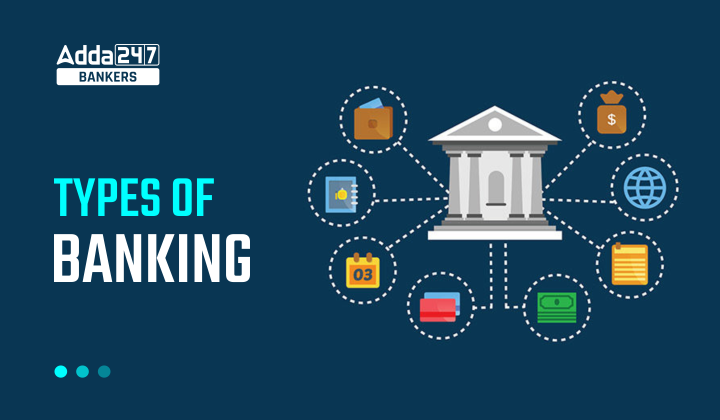Target 30+ is series of static awareness in context of current affairs. This will support your preparation along with the power capsule provided by our team. In this article we are discussing about Types of banking.
Types of Banking
- Branch Banking means when banks can either open new branches or shift the location of existing branches which is defined under the provisions of Section 23 of the Banking Regulation Act, 1949 that banks can either open new branches or shift the location of existing branches.
- Chain Banking refers to the type of banking when a group of persons come together to own and control three or more independently chartered banks. Each of these banks could maintain their independent existence despite common control and ownership. The banks in the chains were assigned specific functions so there was no loss of profits and overlapping of interests.eg Karur vyasa banking
- Correspondent bank refers to a financial institution that provides services to another one—usually in another country. It acts as an intermediary or agent, facilitating wire transfers, conducting business transactions, accepting deposits, and gathering documents on behalf of another bank. Eg: Vostro and nostro accounts.
- Unit banking is a limited way of banking where banks operate only from a single branch (or a few branches in the same area) taking care of local community. Unit system of banking originated in the United States.
- Group Banking refers to a system in which a group of banks functions under a single holding company; the control a company can have over 2 financial institutions. These groups of banks have to follow the rules and regulations of the company. They have to function within the barriers of the company. Eg State Bank of India in India.
- Retail Banking: is banking that provides financial services to individual consumers rather than businesses. Retail banking is a way for individual consumers to manage their money, have access to credit, and deposit their money in a secure manner. It also known as consumer banking or personal banking.
- Wholesale Banking : involves banking services for high net-worth clients like corporate, commercial banks, mid-size companies etc. India has a suitable investment climate and is seen as a favoured investment destination so it has a huge potential for the growth of this vertical of banking. It provides an ease of access to the complete financial portfolio of a client who can easily browse through the same and make suitable allocations, transfers etc.
- Relationship Banking: is a banking system in which banks make deliberate efforts to understand customer needs and offer him products accordingly.It helps banks to gather critical soft information about the borrowers, which helps them to determine creditworthiness of such clients.
- Social Banking will aim for mass welfare, introduce schemes which will fall in line with the development of society. It also strives to make various banking services and products affordable to the society especially the weaker section ( large segment in India) by introducing various technological breakthroughs and cutting overhead costs. Its also called sustainable banking.
- Shadow banking is a term used to describe bank-like activities (mainly lending) that take place outside the traditional banking sector. It is now commonly referred to internationally as non-bank financial intermediation or market-based finance. Shadow bank lending has a similar function to traditional bank lending.
- Digital Banking is an umbrella term that includes all banking activities performed through technological means. Online Banking, a part of Digital Banking, refers to the daily banking practices conducted through internet-enabled devices. The functions of Digital Banking are extensive, whereas Online Banking is for more ordinary activities. Digital Banking poses relatively more security concerns when compared to Online Banking. Digital Banking provides a more personalised experience to meet your financial needs.
- Islamic Banking/Sharia Banking : Islamic banking is banking or banking activity that is consistent with the principles of sharia and its practical application through the development of Islamic economics.
- Narrow Banking : Narrow banks are safe banks. By not lending, and using their deposits to buy government bonds, they carry virtually no credit risk. There is no danger of non-performing loans and frequent injections of equity capital that has to be funded by taxpayers. For the Reserve Bank of India (RBI) too, supervision gets easier. There is no need for deposit insurance.
Target 30+ in General Awareness : Non Performing Assets
Target 30+ in General awareness : Rupee vs Dollar Exchange Rate
Target 30+ in General Awareness: Negotiable Instruments
Recent Posts
| Current Affairs April 2022 | |




 GA Capsule for SBI Clerk Mains 2025, Dow...
GA Capsule for SBI Clerk Mains 2025, Dow...
 The Hindu Review October 2022: Download ...
The Hindu Review October 2022: Download ...
 SBI PO Cut Off 2025, Check Category Wise...
SBI PO Cut Off 2025, Check Category Wise...


